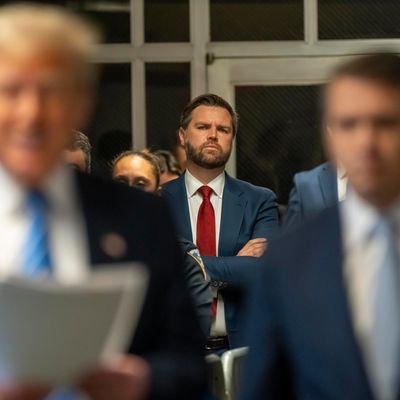

Photo: Mark Peterson/Getty Images
It’s often said the choice of a running mate is the first and most consequential decision a presidential nominee makes. That seems particularly true during an election where there has been intense debate over one party’s nominee stepping aside while his opponent just escaped death by millimeters.
Donald Trump’s selection of Senator J.D. Vance of Ohio as his running mate could be particularly fateful. Mainly, it’s clear Trump was under no compulsion to pick Vance over others on his shortlist. There are no party factions he needs to placate. Geographical or ideological “balance” stopped being a significant factor in vice-presidential selections decades ago, and Vance’s home state of Ohio is safely in the bag. If Trump wanted to choose someone noncontroversial who would never steal the spotlight from him — an even-more-loyal version of the discarded Mike Pence — then Governor Doug Burgum of North Dakota was the obvious option. And if experience in government mattered at all, a man who has spent less than two years in elected office is hardly where you’d look first, second, or third.
So it seems clear Trump picked Vance not only to serve as vice-president but as presumptive heir to the leadership of the MAGA movement. At 39 (he turns 40 next month), Vance will be the third-youngest person ever to be nominated for vice-president by a major party (John Breckinridge was 36 when he was put on the Democratic ticket in 1856, and Richard Nixon was a few months younger than Vance is today when he became the VP nominee in 1952). Vance is half Trump’s age, which means with skill and luck he will be prominent in the national political picture for decades to come. And unlike Burgum, Marco Rubio, Tim Scott, Nikki Haley, or any of the other prospects people talked about during the long months of veep speculation, Vance has no real pre-Trump, pre-MAGA political profile.
Vance rocketed to fame as the author of a book (soon turned into a movie), Hillbilly Elegy, that combines an autobiography rooted in the Ur-MAGA demographic base of white working-class voters with traditional conservative hostility to cultural liberalism and a “populist” openness to right-wing government activism. He does need to live down some sharply anti-Trump comments made in 2016, and the “populist” image he’s cultivated is blurred more than a bit by his gigs as a Beltway lawyer and then a venture capitalist in Silicon Valley eccentric Peter Thiel’s firm. But from the moment he entered the Senate just last year, Vance became the darling of the most ideologically inclined folk in Trump’s orbit, as The Wall Street Journal recently noted:
Some of MAGA-world’s biggest influencers are lobbying Trump to pick Vance, including the right-wing podcaster and current federal inmate Steve Bannon, Turning Point USA’s Charlie Kirk and former Fox News host Tucker Carlson. Carlson said that picking Vance would be “a sign of Trump’s commitment to his own voters,” whose views he said Vance uniquely understands. “Clearly, the leadership of the modern Republican Party is not equal to the most basic task, to represent its voters, and to the extent they don’t do that, they’re useless and deserve to die.”
Donald Trump Jr. is also reportedly a Vance fan. The two men have similar political instincts: They both immediately blamed Democrats for Donald Trump’s near assassination on July 13.
That illustrates perhaps the most striking implication of Trump’s choice of one of the edgiest veep prospects available: It makes a hash of Trump’s alleged interest in toning down his characteristically savage rhetoric and proclaiming a newly discovered “national unity” message. You don’t proclaim a new era of unity and civility by placing one of America’s leading fans of Hungarian authoritarian strongman Viktor Orbán a heartbeat from the presidency. Then again, Trump’s idea of “national unity” may have been best illustrated by this Truth Social post:
Let’s compromise! Do things my way! Let’s unite behind my agenda! If that’s the idea, then a Trump-Vance ticket does make sense, insofar as an authoritarian regime is often advertised as promoting the “unity” of unopposed power. A “new,” peace-loving Vance is as theoretically possible as a “new,” peace-loving Donald Trump, but it’s not a very good bet.




